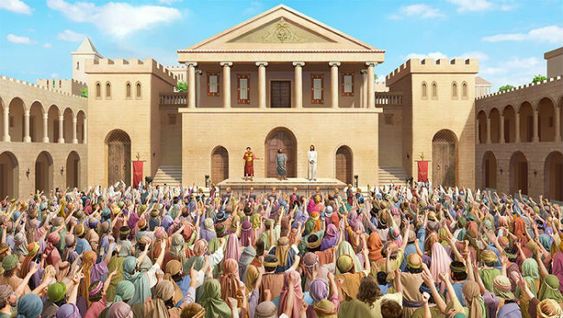Barabbas, the murderer

Jesus died on the cross that was originally intended for Barabbas.
Barabbas is the criminal who, according to the Bible, was released instead of Jesus. His release was suggested by Pilate as an alternative to the release of Jesus, because it was a tradition to release a prisoner during Passover.
The name Barabbas means: “son of the father”.
According to the Gospels, Jesus was accused of blasphemy, mocked, spit on and beaten during his trial before the Sanhedrin; the Gospels differ in order and details.
The Jewish leaders told Pilate that Jesus had taught the people to break Roman law. Pilate felt that Jesus had done nothing wrong. He wanted to let Jesus go.
Procula, Pilate's wife, had had a haunting dream the previous night about what awaited Jesus. She had not been able to talk to her husband about it because he was dragged out of bed so early. But that dream still bothered her. And when she heard that the Jewish leaders had come to Pilate and demanded the death penalty against Him, she could only do one thing: warn him that Jesus was righteous and did not deserve punishment. So she wrote a note and had it taken to Pilate.
The timing of this message was also remarkable. No doubt it was a confirmation of what Pilate already knew in his heart: Jesus is innocent. But Pilate first wanted to wait for the referendum on the release.
In the meantime, the Jewish leaders had had enough time to manipulate the people:
Pilate must have noticed that the Jewish leaders were stirring up the crowd. He made a last attempt to convince everyone of Jesus' innocence. He addressed them as follows: “You have brought this man before me as one who misleads the people, but you know that when I examined him before you, I did not accuse him of any of the things you accuse him of. and neither did Herod, for he sent him back to us, because he has done nothing worthy of death, so I will release him after I have had him flogged.”
That was plain language. Jesus is innocent. But to accommodate the Jewish leaders, he imposed a severe punishment, flogging, but he thought the death penalty was disproportionate. Flogging is also terrible, but he probably thought that the Jewish leaders would certainly not settle for anything less. A reasonable compromise, he thought, and not that bad from his point of view. But the referendum turned out differently.
"Pilate spoke again and asked again, 'Which of the two do you want me to release?' “Barabbas!” they shouted.
This meant that the outcome of the referendum was certain. Barabbas was now a free man. He deserved the death penalty and he knew it. When he was taken from his cell, he probably thought he was about to be crucified. But things turned out very differently, because he was released. How stunned and happy he must have been. And he, a criminal, was now a free man. Who can comprehend such contradictions?